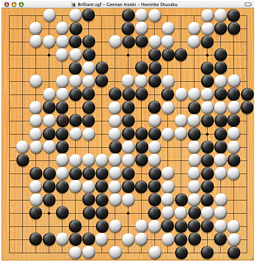Go

In the field of abstract games investigated by AI research, Go constitutes a special case as it is among the most challenging objects in terms of game-tree and state-space complexity. It is expected to remain challenging for the foreseeable future. Over the past decade computer game playing has given valuable innovation in AI research as can be seen best in the field of search. Computer Go has had its share in that advancement as it has given rise to Monte-Carlo Tree Search.
Key Publications
- Werf, E.C.D. van der and Winands, M.H.M. (2009). Solving Go for Rectangular Boards. ICGA Journal, Vol. 32, No. 2, pp. 77-88.
- Lee, C-S., Wang, M-H., Chaslot, G.M.J-B., Hoock, J-B., Rimmel, A., Teytaud, O., Tsai, S-R., Hsu, S-C., and Hong T-P. (2009). The Computational Intelligence of MoGo Revealed in Taiwan's Computer Go Tournaments. IEEE Transactions on Computational Intelligence and AI in Games, Vol. 1, No. 1, pp. 73-89. © IEEE.
- Chaslot, G.M.J-B., Winands, M.H.M., and Herik, H.J. van den (2008). Parallel Monte-Carlo Tree Search. In Computers and Games (CG 2008), Vol. 5131 of Lecture Notes in Computer Science (LNCS), pp. 60-71. © Springer, Berlin Heidelberg.
- Chaslot, G.M.J-B., Winands, M.H.M., Herik, H.J. van den, Uiterwijk, J.W.H.M., and Bouzy, B. (2008). Progressive Strategies for Monte-Carlo Tree Search. New Mathematics and Natural Computation, Vol. 4, No. 3, pp. 343-357. © World Scientific Publishing Company. Received the 2008 ChessBase Best-Publication Award.
